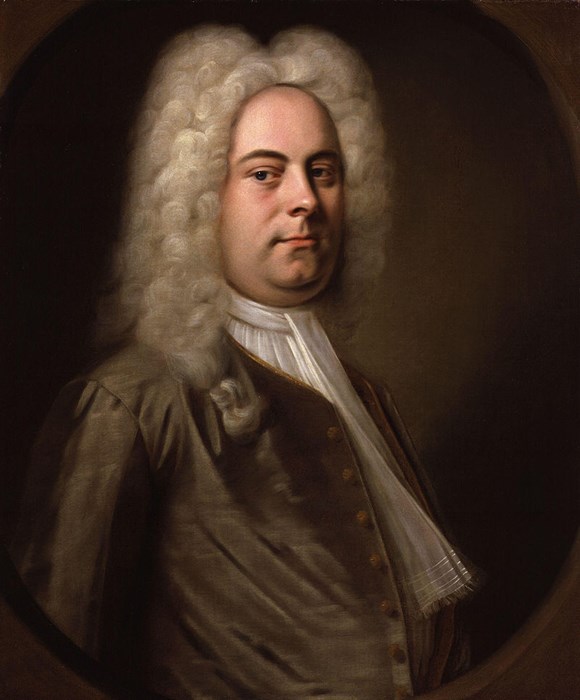George Frideric Handel
Born in the German town of Halle in 1685, George Frideric Handel studied briefly at the University of Halle before moving to Hamburg in 1703, where he served as a violinist in the opera orchestra and subsequently as harpsichordist and composer. From 1706 to 1710 he was in Italy, where he further developed his mastery of Italian musical style. Appointed Kapellmeister to the Elector of Hanover, the future George I of England, he visited London, where he composed the first London Italian opera, Rinaldo, in 1710 and settled two years later. He enjoyed aristocratic and later royal patronage, and was occupied largely with the composition of Italian opera with varying financial success until the 1740s. He was successful in developing a new form, the English oratorio, which combined the musical felicities of the Italian operatic style with an increased role for the chorus, relative economy of production, and the satisfaction of an English and religious text (elements that appealed to English Protestant sensibilities). In London he won the greatest esteem and exercised an influence that tended to overshadow the achievements of his contemporaries and immediate successors. He died in London in 1759 and was buried in Westminster Abbey in the presence of some 3,000 mourners.
Handel wrote over 40 Italian operas, the majority for staging in London. The operatic conventions of the time, restricting subject and form, and the major use of castrato singers in the principal male roles led to a general neglect of this important part of Handel’s work, but the increased cultivation of male soprano and male alto voices and a growing understanding of Handel’s achievement within the limitations of the genre generated a renewed appreciation in recent years. Arias and other operatic excerpts, however, have retained a continued place in vocal and to some extent instrumental repertoire. In particular an aria from the opera Serse of 1738 ‘Ombra mai fù’, popularly known as Handel’s ‘Largo’, has reappeared in every possible arrangement. Other arias are familiar in something approaching their original form. These include ‘Lascia ch’io pianga’ (‘Let me weep’) from Rinaldo, Handel’s first opera for London,[the purple text is redundant, already mentioned in the previous paragraph] ‘Piangèro la sorte mia’ (‘I shall lament my lot’) from Giulio Cesare and ‘Care selve’ (‘Dear woods’) from Atalanta.
Messiah is by far the best known of all English oratorios. Its three parts deal with the birth, passion and resurrection of Christ, using a text in part derived from the Bible and from the version of the Psalmsfamiliar from the Church of England’s Book of Common Prayer. The work was completed and first performed in Dublin in 1742. It was later repeated annually in London in aid of the Foundling Hospital. Israel in Egypt, Judas Maccabaeus, Samson (based on Milton), Saul, Deborah and Solomon are only some of the English oratorios of Handel that are familiar in whole or in part to choirs and audiences, along with Athalia and Esther, based on Racine. To these may be added the secular oratorio Semele, with a text by the dramatist William Congreve, dealing with an episode from classical mythology and including, for a disguised Jupiter, the well-known aria ‘Where’er you walk’. Less familiar are Gideon, Nabal and Tobit, compiled from Handel’s works after his death by his assistant John Christopher Smith, who continued the tradition of oratorio performances that had by then been established.
MapThe Barnes Foundation
Dates are Sept. 2018.
| Sat, Sep 22 | 9:00 p.m. |
| Sun, Sep 23 | 9:00 p.m. |
| Sun, Sep 30 | 9:00 p.m. |
Gallery Hour: Explore select galleries of the Barnes Foundation, open exclusively for Glass Handel ticket holders starting at 8:00 p.m.
The performance running time is approximately 66 minutes with no intermission.

